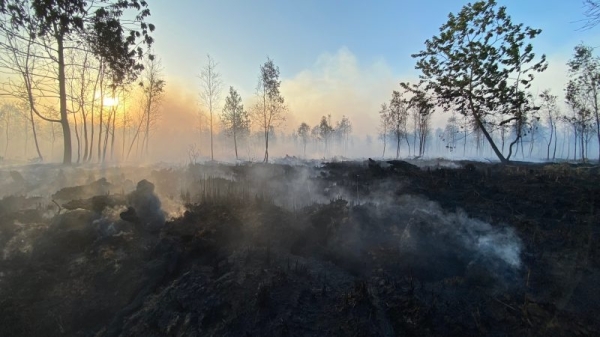Why the Nature Restoration Law is not just about the environment

Lately, Europe’s political agenda has been dominated by new deals for industry and competitiveness, where acting for increased sustainability is pitched against economic profitability – this is a false narrative, argues Adeline Rochet.
This false narrative is being played out for short-term electoral appeal over the European Green Deal and proposals related to nature, agriculture, and food industry interests.
With a final vote in the EU Parliament on the Nature Restoration Law (NRL) due to take place on Tuesday, it is crucial that decision-makers keep this big picture in mind and bolster the European strategy of competitive sustainability by voting in favour of the NRL.
It would be a strategic mistake to consider the health of our environment in isolation from the health of our economy. Both require strong support and fast action to build a resilient society, capable of withstanding future shocks – whether these come from climate disasters, geopolitical tension or aggressive trade practices from global competitors.
If there’s one area of growth that Europe could do without, it’s environmental deterioration: soil loss is projected to increase by 13 to 22.5% in the EU and the UK by 2050.
That’s around one-fifth of the total surface of the European Union – the equivalent of France and Italy losing essential nutrients and organic matter to the point that food productivity drops.
Soil loss is also associated with greater vulnerability to climate disaster, accelerated biodiversity collapse, poor capacity to retain water and grow plants – and in return, this increases greenhouse gas levels. Science tells us that restoring degraded land is beneficial for farmers and food production, leading to more fertile soil, better resistance to extreme weather, improved working conditions and higher productivity.
Yet, despite the urgent need for action, restoring nature is still not a consensus. The resistance arises partly from a lack of good understanding of the multiple benefits it brings, both at the macro-economic and localised level – and is bolstered by the economic stressors felt by communities and farmers.
However, the numbers paint a compelling picture in favour of restoring nature. According to the European Commission, in its impact assessment of the NRL, “the monetary benefits of restoring the EU’s priority habitats are estimated to reach around €1,860 billion, with costs estimated at around €154 billion”.
This translates to a net gain of about €1,706 billion. It trickles down to local communities too. If you look at the overall direct benefits of Natura 2000 (a network of protected areas covering Europe’s most valuable and threatened species and habitats) they amount to between €200 to 300 billion annually.
Restoration projects not only create jobs locally, but they also offer broader development perspectives in areas that direly need them, especially in rural and deindustrialised communities.
Leading businesses across a range of sectors have already recognised the economic imperative of nature restoration. Over 1400 companies, including those in the agri-food sector, are loudly calling to stop nature loss.
They see that acting strongly on emissions reduction targets is designed to fail if you don’t act for ecosystems and biodiversity simultaneously. If a well-designed, nature-positive policy allows us to kill four birds with one stone – to create new economic opportunities, cut emissions, enhance resilience towards accelerating consequences of climate change, and improve global health.
The Nature Restoration Law is a world first of its kind. It’s a unique opportunity for Europe to show leadership and gain a competitive advantage through innovation for its agri-food industry, particularly for farmers.
This law, as stressed by over 140 businesses in an open letter in support of nature-positive action in Europe, holds huge transformative potential. Binding targets to revert the effects of pollution and the destruction of ecosystems will give a clear signal to investors and financial actors.
If Europe puts its weight behind it, it will set a worldwide precedent to be replicated globally, creating mass markets and a positive loop towards truly sustainable societies.
The message that human activity has damaged the planet critically close to the point of no-return, and exceeded six of the nine planetary boundaries, is a wake-up call.
The window of opportunity will not remain open for long, and lawmakers must seize every chance they get. We must work to ensure our future competitiveness, resilience and prosperity by voting in favour of the Nature Restoration Law – this will require vision, clarity and resolve.



